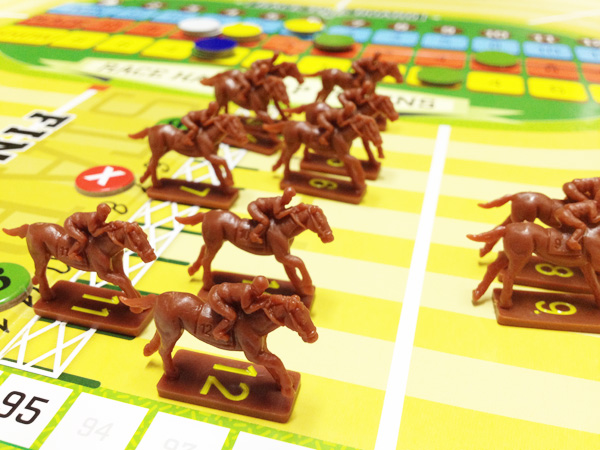HomeStretch: Horce Racing Comes to Your Table

Saddle up and get ready to head to the tracks! HomeStretch by R&R Games brings the excitement of horse racing right to your table. Whether or not you are into horse racing or you are a skilled gambler, there is fun to be had cheering on your miniature horses to the finish line.
Game Play
HomeStretch comes with a game board (the race track), horses, owner share cards, race track cards, handicap tokens, bet tokens, and scoring markers. The object of the game is to amass the most amount of money through four races. Money is earned in two ways: owning a share in the winning horses (those who place first, second, or third in each race) or betting on the winning horses. Each player starts out with $50,000 (the 50 space on the score track).
The movement of the horses around the track is simple. On each turn, the player determines which horse to move by rolling two six-sided dice and adding up the total. For instance, if a 2 and a 7 are rolled, horse #9 is moved. The player can choose to 1) move the horse forward two spaces, or 2) move the horse forward one space, roll again, and move that horse two spaces. If the horse has already crossed the finish line, the player chooses a horse in last place to move forward up to 3 spaces (depending on the difference between the two dice).

Some horses have handicaps placed on them, which affect the first movement of the horse. If an 'X' token is placed next to a horse, the first movement is cancelled (keeping the horse in the stall). If a '+n' token (with n being either 2, 4, or 6) is placed next to a horse, that number is added to the first movement, giving the horse extra momentum.
At the beginning of the game and after the first round, players draft horses for which they will own shares. Each horse has a different cost to purchase a share initially (i.e., $10,000 for horse #7). Players who own shares in the winning horse split the purse (the winnings) for that race. For instance, if the purse for first place is $12,000 and 2 players own a single share in the winning horse, both players earn $6,000. There are also purses for the second and third place winners.
For each race, a randomly-drawn race track card specifies the purses for each winner and the handicaps associated with each horse. After the race track card is revealed, players place their bet tokens on the board, trying to predict which horses will be the winners. Bet tokens not only mark the bets for each player, but they multiply the payout by up to $3,000, depending on the number displayed on the token. Bets can be placed on any horse for first, second, or third place.
Each time a player spends or wins money, he moves his scoring marker along the score track the appropriate number of spaces. After the fourth race is completed, the player with the highest score (furthest along the score track) wins!
Review
There is definitely a learning curve with HomeStretch, especially if you are unfamiliar with horce racing in general. The movement and handicaps of the horses are straight-forward enough, but learning the payout system required multiple passes through the rule book. It took awhile for us to grasp the difference between the purse payouts and the bets, which are actually independent of each other (our ignorance of horse racing didn't help here). A video tutorial from the publisher would be a helpful addition to the game.
Once we finally grasped the payout system, however, we had a lot of fun with it. There is a lot of tension and excitement as the horses near the finish line, which incited plenty of cheering (and booing) from the players — this emotional involvement is one of its strong points. We felt that the mechanics were sound and the game was well-balanced — even players who fall behind early on can come back quickly with good bets.
The core movement mechanic statistically favors the horses closer to the middle, with #7 being the most probable, but this is balanced by several factors:
- The owner shares are more expensive for more probable horses.
- The bet payouts are much higher for less probable horses.
- Handicaps typically favor less probable horses while punishing more probable horses.
In the end, HomeStretch is an effective game that seems to emulate the excitement of being at the race track. In my opinion, it's not exactly a casual game, but it plays relatively quickly and there is certainly much fun to be had for casual gamers who are either horse racing fans or don't mind putting in the effort to learn some of the basic principles of horse racing. Personally, I hope to get it to the table again soon.
Pros: Exciting races, sound game mechanics, good balance of luck and strategy
Cons: High learning curve for non-horse racing fans
Full disclosure: we received a complimentary review copy of this game.







